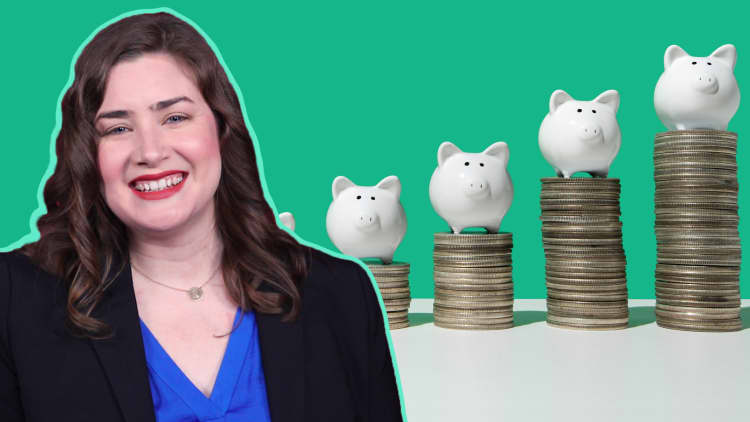Uncertainty is perhaps the only certainty heading into the investing environment in 2020.
This week, investing powerhouse Charles Schwab released its 2020 market outlook, noting that the outlook on many key factors that could have an enormous impact on the markets, such as global trade, economic growth and manufacturing, remain decidedly uncertain.
If the U.S. and China reach a trade deal, for example, that could reassure businesses and spur investment. However, if the trade deal falls through, the manufacturing sector remains weak, Schwab says. If that continues or worsens, it may lead to widespread job losses and a possible recession.
While the future may be hazy, Schwab's top strategists say that to weather any upcoming market conditions, consumers should focus on avoiding these three common investing pitfalls.
1. Sitting on cash
"On the fixed income side of things, the big mistake of last year was to sit in cash," says Kathy Jones, Schwab's chief fixed income strategist. Fixed income is a type of investment that pays out a fixed amount of interest. Bonds, such as U.S. Treasurys, are the most common type of fixed income investment.
Americans are holding a lot of cash. Balances in money market funds hit $353 billion over the past three years, a 55% increase, according to analysis from research firm DataTrek. Deposits in U.S. banks also increased 11% during the same time period.
Many times, consumers feel that if they can get the same yields on cash investments versus long term bonds, cash seems like the safer bet, Jones says. But in this case, they gave up higher returns by using this strategy. Over the past year, the Bloomberg Barclays U.S. Aggregate Bond Index, which consists of approximately 17,000 bonds, has returned well over over 9%.
By comparison, Vanguard's Prime Money Market Fund has earned 2.13% year-to-date, while the top high-yield savings accounts have interest rates currently hovering below 2%.

Yet money market and high-yield savings are better than keeping cash at home. If you're stuffing money under your mattress, you're not able to take advantage of interest. Plus, inflation actually eats away at the value of your money, so leaving large amounts of cash lying around can make it harder to achieve your long-term financial goals.
Even if you don't expect inflation to increase and eat up all your gains (currently inflation in the U.S. is about 1.8%), keeping your money in savings or money market funds is "usually not the investment strategy to take over the long run," Jones adds. While that's advice you would expect to hear from a fixed income expert, it makes sense here. Plus, bonds and similar investments also allow consumers to spread out their risk and gain dividends without trying to time the market, making them an important component of a well-rounded portfolio.
"It has been easy to go back to cash because cash rates were good," Jones says. But that may not always be the case, and as markets change, having a cash stockpile may cause people to chase returns at just the wrong moment.
2. Failing to regularly rebalance
Markets aren't static, so you'll need to rebalance periodically to make sure that your investments are not off course.
What does that mean? Let's say you set up your portfolio as 60% allocated toward stocks and 40% allocated toward bonds, which is fairly typical. Stocks have outperformed recently, so with their returns, your portfolio might now sit at 75% stocks and 25% bonds. By rebalancing, you can sell off a bit of your stock gains and put more money elsewhere, like into bonds.
"We've really been pounding the table on rebalancing more frequently and taking advantage of these things," says Liz Ann Sonders, Schwab's chief investment strategist. Sonders cited the bear market that culminated last December and the big upturn that occurred thereafter, saying that investors who rebalanced may have been able to buy when the markets were down in December and sell at higher rates when it bounced back.

Most experts recommend rebalancing at least once a year, but another good rule of thumb is to look at your asset allocations. If they're off by more than 5% to 10%, then it's likely time to rebalance. If you're invested in a managed account, your financial institution or advisor will typically take care of rebalancing your portfolio for you. The same is true if you're invested in a target date fund in your retirement account.
The best part about rebalancing: Your portfolio tells you when it's time to do something. You don't have to rely on an expert on TV to make the right short-term market call, Sonders says. "If an asset class has had underperformance, it's now shrunk as a weight in your portfolio and that forces us to do what we know we're supposed to do: buy low, sell high," she says.
"That's about as close a thing to a free lunch as you get," Sonders says. Especially with all these macro uncertainties hovering, many of which are so unique — the geopolitical climate, the international trade issues. Investors should stay close to their benchmark asset allocations and be prepared to rebalance if their portfolio gets out of whack.
3. Focusing on past winning strategies
"Diversification just goes against investors' instincts at times like these," says Jeffrey Kleintop, Schwab's chief global investment strategist.
When markets get difficult, investors tend to concentrate their portfolio on a strategy that had been working. Yet investors who are focused on what's worked before may miss an important turning point, Kleintop says. Take Netflix stock, for example. It was one of the hottest stocks of 2018, returning 39% last year. However, Netflix has underperformed the market this year (the S&P 500 Index has been up 25% year-to-date), returning just over 9%.
Instead, Kleintop recommends keeping an open mind when it comes to investing and make sure you have a balanced, diversified investment mix. "Look what happened over the last year — every major asset class produced above-average returns," Kleintop says. "It paid to be broadly diversified."
Don't miss: If you can answer these 5 questions the right way, you can still spend money—even if you're in debt
Like this story? Subscribe to CNBC Make It on YouTube!



